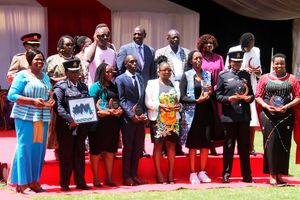
US President Donald Trump delivers remarks during a Business Roundtable event in Washington on March 11, 2025.
Recent political events since the start of this year have created significant headwinds for global climate and development action. The barrage of executive orders, legal threats and regulatory cuts have left many stunned. In January, US President Donald Trump issued an executive order suspending foreign aid, primarily administered by USAid. This unprecedented move - given that USAid is one of the largest development aid agencies in the world - led to massive job losses, and halted essential health and education programs across Africa. Subsequently, other Western nations, including the UK, France, and Germany, reduced their development aid spending.
While these challenges are real and numerous, the economic and scientific case for pursuing climate and development goals, especially for low to middle-income countries, remains an overwhelming priority: On average, African countries are losing 2–5 per cent of Gross Domestic Product (GDP) and many are diverting up to 9 per cent of their budgets responding to climate extremes, and just last week, the US administration withdrew from the board of the UN's climate damage fund dedicated to helping poor and vulnerable countries cope with climate losses and damages.
But as the US re-sets its investment and development priorities, and Europe re-sets theirs as well, what is Africa’s plan? This is the question we must all ask. It reminds me of the classic “if you fail to plan, you plan to fail!”
Prioritize self-reliance
We must surely stay focused and calm in the face of these turbulent changes around us and recalibrate as a community - African Union (AU), Economic Commission for Africa (ECA), Economic Community of West African States (ECOWAS), Common Market for East and Southern Africa (COMESA), Community of Sahel-Saharan States (CEN-SAD), Arab Maghreb Union (AMU), (Intergovernmental Authority on Development) IGAD, Economic Community of Central African States (ECCAS), and Southern African Development Community (SADC). All of us must regroup and focus on economic development.
It is sobering to recognise the extent to which many of Africa’s essential social services have depended on development partners like USAid, outsourcing critical pillars of stability. For decades, African governments have relied on steady flows of external finance, often without a clear strategy for independence. This reliance underscores the urgent need for an urgent transformative shift. The recent events are a call to action for governments to prioritize self-reliance, sustainability, and innovation.
This fact in itself, must be the wake-up call. It is a crucial turning point, not just for our governments, but for us as citizens. Achieving economic development for Africa is non-negotiable. As I have shared many times in this column, we will never be able to adapt against poverty - we must develop our economies so we all rise and build lasting resilience.
Africa’s immense opportunities
We know there are real opportunities for Africa. This year Africa will again host the Africa Climate Summit (ACS). Hosting ACS 1 in 2023 was essential to amplify the continent’s voice in global climate discourse and address its unique challenges. It also showcased Africa’s green competitive advantage - the youngest and fastest growing work force in the world, vast potential in renewable energy, and an abundance of critical raw materials - emphasizing solutions led by Africans for Africans.
This gathering symbolized a shift from victimhood to leadership, positioning Africa as a key player in shaping global climate action while prioritizing its resilience and development goals. But the truth remains that no one is going to applaud us for having a “green competitive advantage”. That’s just potential and as Nobel Peace Prize Laureate Norman Borlaug once reminded us “you can’t eat potential!” Africa must boldly package and market its strengths in the global race for capital, turning its green competitive advantage into transformative action. This is work that must happen on African soil, sector by sector led by Africa’s farmers, engineers, architects, entrepreneurs, contractors, and manufacturers, with the support and facilitation of our governments.
The historical extraction of Africa’s resources must also be challenged in the spirit of transparency, accountability and self-reliance. It is unconscionable that the Democratic Republic of Congo (DRC) is considered the world’s richest country in terms of natural resources, with raw materials estimated to be worth over $24 trillion. Yet, according to the World Bank, the DRC remains among the five poorest nations, with 73.5 per cent of its population living on less than $2.15 a day in 2024. In that same year, the DRC received $838 million in humanitarian assistance from the United States.
It’s time for Africa to rise and redefine its narrative. Let us move beyond being mere consumers of global production and focus on creating value that transforms our continent on our own terms. By forging strong public-private partnerships, we can shift perceptions of high risk, attract domestic and international capital, and unlock Africa’s immense opportunities. We have our work cut out for us but it is not beyond us if we act decisively and swiftly. This is our moment to lead, innovate, and build a future that reflects the greatness of Africa. It IS time for Africa.
Wanjira Mathai is the MD for Africa & Global Partnerships at the World Resources Institute and Chair of the Wangari Maathai Foundation.







